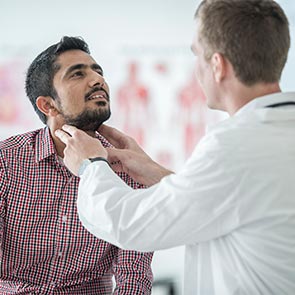Multiple Endocrine Neoplasia Treatment in Wesley Chapel, FL

Do you have throat inflammation, muscle pain, or vision changes? Are you experiencing a thyroid condition, kidney stones, or high blood pressure? It may be multiple endocrine neoplasia (MEN), a group of hereditary disorders that affect the endocrine system.
There are different multiple endocrine neoplasia types. Most of them affect the thyroid, adrenal, and pituitary glands. MEN can stimulate tumor growth on these glands, making them overproduce hormones and trigger symptoms like constipation, weight gain, and bone thinning.
MEN treatment involves hormone medication and surgery to remove the affected glands. To speak with a multiple endocrine neoplasia specialist today in Wesley Chapel, call (813) 536-3212 or contact Dr. Christopher Van Benschoten online.
What are the different types of MEN?
The different types of multiple endocrine neoplasia syndrome affect these different glands in different ways. The major glands that are affected by MEN are:
- pituitary
- thyroid
- parathyroid
- adrenal
- pancreas
While MEN 1 and 2 are the most common, each subtype affects one in every 30,000-35,000 people.
Multiple Endocrine Neoplasia Type 1 (MEN1)
Also called multiple endocrine adenomatosis or Wermer's syndrome, multiple endocrine neoplasia type 1 is the result of mutations of the MEN1 gene, causing tumor growth on the parathyroid gland, and then on the pancreas or pituitary gland.
Multiple Endocrine Neoplasia Type 2 (MEN2)
Caused by mutations to the RET (ret proto-oncogene) gene, there are three subtypes of multiple endocrine neoplasia type 2.
Type 2A (MEN2A): tumors or excessive growths form on at least two of the following three glands: thyroid, adrenal, or parathyroid. Almost everyone with MEN2A develops medullary thyroid cancer (cancer that occurs in the parafollicular C cells of the thyroid that produce calcitonin), and about 50% develop adrenal gland tumors (pheochromocytomas).
Type 2B (MEN2B): formerly called multiple endocrine neoplasia type 3, this type can cause adrenal gland tumors, medullary thyroid cancer, and painful growths around nerves in your mucus membranes (neuromas).
Familial medullary thyroid carcinoma (FMTC): patients with this condition have an 80% chance of developing medullary thyroid cancer, but less than a 5% chance of developing other endocrine tumors.
MEN type 4 is the rarest form of multiple endocrine neoplasia. While the condition causes symptoms that are similar to MEN1, it is the result of mutations to the CDKN1B gene, specifically the tumor-suppressing protein p27kip1.1
What are the symptoms of MEN?
Your body's endocrine system is a series of glands that release hormones that control important functions like growth and metabolism. This is why diseases that affect these glands can cause serious effects throughout the body.
Multiple endocrine neoplasia symptoms vary depending on the type and the glands that are affected. Symptoms can appear as early as age five.
Symptoms of MEN1 include:
- hyperparathyroidism (parathyroid gland overproducing hormones), causing fatigue, muscle pain, constipation, kidney stones, or bone thinning
- ulcers
- esophageal inflammation
- diarrhea and abdominal pain
- headaches
- vision changes
- problems with sexual function and fertility
- high blood pressure
- enlargement of the bones (acromegaly)
- Cushing's syndrome (high levels of the hormone cortisol), causing weight gain, stretch marks, thinning skin, and slow healing
Symptoms of MEN2 include:
- growths around nerves (neuromas) in mucous membranes, presenting as small benign tumors on the lips, tongue, mouth lining, eyelids, and surface of the eyes
- bone abnormalities of the feet and thighs
- loose joints
- curvature of the spine
- long limbs and being tall and slender
- enlargement and irritation of the large intestine, causing diarrhea and constipation
How is MEN diagnosed?
Specific tests used to diagnose multiple endocrine neoplasia include:
- genetic tests (with a blood sample)2 to detect mutations in the MEN1, RET, or CDKN1B genes
- blood and urine tests to detect elevated hormone levels
- imaging tests like ultrasonography, MRI, and CT scans to help physicians locate tumors
Screening family members is particularly important because about 50% of MEN patients' children inherit the disease. If you have a family member with MEN but do not have symptoms yourself, you should undergo a genetic test to determine your risk.
How is MEN treated?
While there is no treatment for any type of multiple endocrine neoplasia, the affected endocrine glands can be treated individually with surgery, medication, or radiation therapy. As with any treatment, results will vary from patient to patient, depending on age, genetics, environmental conditions, and other health factors.
Surgery can remove endocrine glands to either prevent or treat the following conditions:
- removing the thyroid gland to treat medullary thyroid cancer - sometimes the surrounding lymph nodes are also removed
- removing almost all of the four parathyroid glands to treat parathyroid tumors
- removing the entire adrenal gland to treat pheochromocytoma
- removing all or part of the pituitary gland to treat pituitary tumors
Because multiple tumors are often present, treatment for MEN1 requires a team of experts.3 Surgery can also be used to remove pancreatic tumors.
Side effects of endocrine gland removal include:
- adverse reaction to general anesthetic
- heavy bleeding
- infection with symptoms like fever, swelling, nausea, and unusual drainage
- nerve damage
- damage to the remaining gland
- temporary low blood calcium levels that can be treated with supplements
- watery drainage from the nose (specific to pituitary surgery)
Hormone replacement therapy can be used to treat hyperthyroidism caused by MEN. If your thyroid gland is removed, you will need to take thyroid hormones for the rest of your life.
Side effects of hormone replacement therapy can include:
- weight loss
- fever
- headaches
- diarrhea
- sleeplessness
- nervousness or irritability
- rapid or irregular heartbeat
- shortness of breath
- excessive sweating
- hair loss
- decreased bone density
- muscle weakness or leg cramps
- impaired fertility or changes in menstrual periods
Medications can also be used to help you regulate your high blood pressure. Side effects of these medications can include dizziness, fatigue, and nausea.
Radiation therapy can also be used to destroy tumors. Chemotherapy can be used to treat thyroid cancer that has spread to the rest of the body. Radiation can also be used to treat pituitary tumors if the gland cannot be removed. Common side effects of radiation therapy include dry, itchy, or peeling skin, fatigue, and hair loss.
Reserve Your Appointment Now
There are many medications and surgical procedures that can treat hormonal imbalances from multiple endocrine neoplasia. To speak with a multiple endocrine neoplasia specialist today in Wesley Chapel, call (813) 536-3212 or contact Dr. Christopher Van Benschoten online.
Sources:
1. Lee M, Pellegata NS. "Multiple endocrine neoplasia type 4." Frontiers of hormone research 41 (2013): 63-78. Web. 12 June 2018.
2. Marini, Francesca, Francesca Giusti, and Maria Luisa Brandi. "Genetic Test in Multiple Endocrine Neoplasia Type 1 Syndrome: An Evolving Story." World Journal of Experimental Medicine 5.2 (2015): 124–129. PMC. Web. 13 June 2018.
3. Thakker, Rajesh V. "Multiple Endocrine Neoplasia Type 1 (MEN1) and Type 4 (MEN4)." Molecular and Cellular Endocrinology 386.1-2 (2014): 2–15. PMC. Web. 12 June 2018.
Evolution
Address
4691 Van Dyke RoadLutz, FL 33558
(813) 536-3212
www.evolution4health.com
Hours
Mon:
10:00 am - 4:00 pm
Tue:
10:00 am - 4:00 pm
Wed:
10:00 am - 5:00 pm
Thu:
10:00 am - 6:00 pm
Fri:
10:00 am - 3:00 pm
Sat:
Closed
Sun:
Closed


